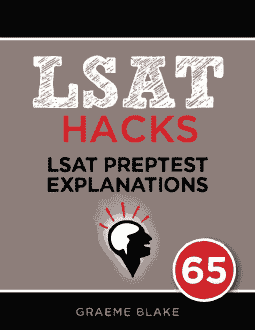QUESTION TEXT: The proportion of fat calories in the diets of people…
QUESTION TYPE: Flawed Reasoning
CONCLUSION: Reading labels promotes healthy behavior.
REASONING: People who read labels tend to eat less fat.
ANALYSIS: This argument makes two errors. One is a causation-correlation error. It could be that people read labels because they want to avoid fat. So it’s the healthful behavior that causes label reading, and not the reverse.
The argument also assumes that eating fat is unhealthy. There is, in fact, little to no evidence that saturated fat is harmful. So we can’t conclude that people are healthier because they avoid fat.
The LSAT sometimes recognizes that fat isn’t harmful, and it sometimes doesn’t. In this case, the correlation is the surer error.
___________
- CORRECT. This reverses the arrow of causation. It could be that people try to eat less fat and therefore they look at labels to avoid it.
- Actually, the sample here is the entire population. The stimulus looks at the behavior of those who read labels and those who don’t: that’s 100% of people.
- This answer refers to mixing up sufficient and necessary conditions. But the stimulus doesn’t contain any sufficient or necessary conditions. For instance, looking at labels is not a sufficient condition for avoiding fat. There’s just a correlation between the two. Some people might look at labels and eat lots of fat.
- This is a different error, a false dichotomy. It’s like saying: ‘either is will rain or it will be a nice day’. That’s wrong: it’s possible it might not rain, but be really humid and unpleasant. This wasn’t the error in the stimulus.
- This is a different error. It’s like saying “John dropped the dishes and broke them. So John must have intended to destroy our dishes”. It ignores the possibility that the consequences didn’t match the intentions.


I wonder what you make of the “illicitly” infers causation wording in the correct answer… Really threw me off. I think of illicit as meaning illegal (obviously this is a second or third definition). Any general advice on how not to get throw by odd wording choices like that?
Hi Jeremy!
It’s important to keep in mind that the LSAT is always trying to trip you up – here they’re using a different word when “incorrectly” would have sufficed.
Your instinct was correct to think of “illegal” as the definition – ultimately, I’d tell you to trust the initial connotation of the word. Illicitly has a clearly bad connotation – so it must mean that they wrongly inferred causation from correlation.